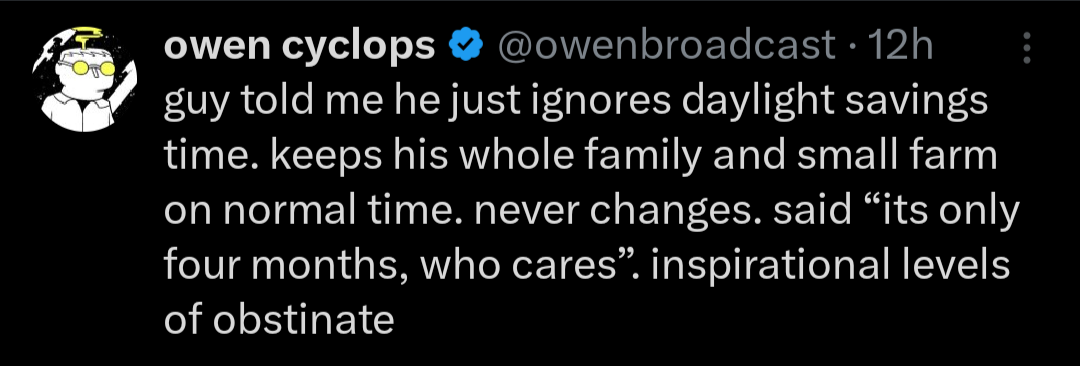this post was submitted on 07 Oct 2024
1141 points (99.4% liked)
People Twitter
5508 readers
2105 users here now
People tweeting stuff. We allow tweets from anyone.
RULES:
- Mark NSFW content.
- No doxxing people.
- Must be a pic of the tweet or similar. No direct links to the tweet.
- No bullying or international politcs
- Be excellent to each other.
- Provide an archived link to the tweet (or similar) being shown if it's a major figure or a politician.
founded 2 years ago
MODERATORS
you are viewing a single comment's thread
view the rest of the comments
view the rest of the comments

In summer, we have about 15 hours of daylight and 9 hours of night. In winter, we have about 9 hours of daylight, and 15 hours of night. In summer, on standard time,, we get about 3 more hours of daylight in the morning, and 3 more hours of daylight in the evening than we do in winter.
Suppose you use a constant schedule year round, and set your alarm clock to wake you 30 minutes before sunrise in the middle of winter. If you kept that same alarm into summer, you would be sleeping through the first 2.5 hours of daylight.
DST "saves" one of those morning hours, by shifting the clock forward. Relative to standard (winter) time, you add 2 hours of daylight in the morning, and 4 in the evening, instead of 3 and 3. Switching to DST (theoretically) minimizes disruption to our morning schedule.
I think we should focus on the evening instead of the morning. The evenings are where the overwhelming majority of us are free of work, school, and other obligations. Our mornings belong to bosses and teachers; The evenings are our time for home and family, rest and recreation.
If we are going to change times, we should reverse the time change. Instead of "falling back", we should skip forward in November, minimizing disruption to our evenings instead of their mornings. Imagine winter sunsets at 6:30 PM instead of 4:30PM. Imagine the kids being able to play outdoors for two more hours after school than they currently get.
Alternatively, (and preferably) we should just stay on "Summer" time year round.
What? No. Noon is when the sun is directly overhead.
You are describing solar noon: the highest position the sun reaches during the day.
Solar noon occurs some time between 11:30AM and 12:30PM in local standard time, depending on where exactly you are within your time zone: the east edge of your time zone experiences solar noon 60 minutes earlier than the west edge of your time zone. Solar noon only matches local standard time in the middle of the timezone.
Solar noon occurs between 12:30 PM and 1:30 PM in local Daylight Savings Time, depending on where exactly you are within your time zone. The clocks have shifted an hour, pushing solar noon an hour later in the chronological day.
Solar noon does not occur at 12PM during the summer in locations that observe DST. The clock shifts forward relative to the sun, moving solar noon back an hour.
We gain 6 hours of daylight.
Under standard time, we gain 3 hours of daylight before noon and 3 hours after noon going from winter to summer. Sunrise is about 3 hours earlier, and sunset is about 3 hours later.
But, because we also shift the clocks, sunrise is only two hours earlier in summer DST than winter Standard Time. Sunset is four hours later in summer DST than winter Standard Time. We effectively gain 2 hours of morning and 4 hours of evening time.
"Suppose you use a constant schedule year round"
It took a full paragraph to get to saying you didn't read them comment and then four more to elaborate on that?
I introduced the concept of consistent morning schedules, and I briefly argued that we should make our evening schedules consistent, rather than our morning schedules. This would require not eliminating the time change, but reversing it.
I challenge you to find any other proposal for reversing DST: Fall Forward, Spring Back.